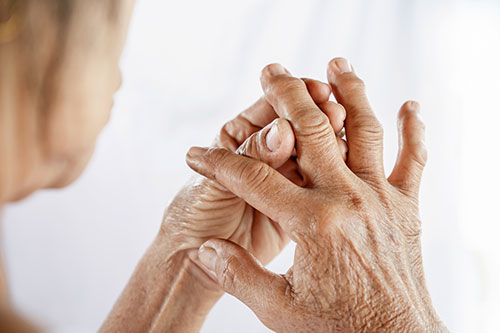Rheumatoid Arthritis – FAQs
What is rheumatoid arthritis?
Rheumatoid arthritis (RA) is an autoimmune disease where our own immune system affects our body parts. Initially, it affects the joints predominantly. It can affect other organs if the disease is not controlled properly.

How to identify rheumatoid arthritis early?
Presence of pain and stiffness in small joints of hand or feet for at least 30 minutes duration, on getting up from bed. Pain/stiffness reduces as we start moving around.
Next stage, we notice pain and swelling of small and large joints of hands and legs.
Who are all at risk for rheumatoid arthritis? Can young people get rheumatoid arthritis?
Rheumatoid arthritis is more common in females between 30-50 years of age.
It can involve males, the elderly and even kids (juvenile idiopathic arthritis).
What are the tests to be done to confirm rheumatoid arthritis? Are they always positive?
- Rheumatoid factor and anti-CCP are positive in only 65-70% and in the remaining it can be negative but still the patient can have rheumatoid arthritis.
- ESR and CRP are tests that help in assessing the disease activity and usually they are elevated.
Are steroids and pain killers the only treatment?
Definitely not. Steroids and pain killers are only given temporarily to reduce the pain and inflammation. The disease-specific drugs take 8-12 weeks to start acting. Hence, steroids or pain killers are prescribed initially and then stopped.
What are the life style changes needed to manage rheumatoid arthritis?
- Adequate sleep
- Exercises and yoga/meditation
- Healthy and balanced diet; reduce carbohydrates and sugars; fish intake (omega-3 fatty acid) might help.
Is rheumatoid arthritis curable? Or one has to suffer throughout his life?
Early initiation (less than 3 months) of treatment helps control the disease better. Among 10 patients, 1 or 2 might be able to stop the drug on early and prompt initiation of RA specific drugs.
Can be pain-free without the help of pain killers or steroids and have a good quality of life.
What might happen if we don’t get treated for rheumatoid arthritis?
Inadequate disease control leads to two issues:
- Joint deformities
- Extra-articular complications – involvement of other organs like lungs, eyes, blood vessels, etc.
Whom to approach to get treated for rheumatoid arthritis?
The specialist who is trained to treat an autoimmune disease like rheumatoid arthritis is known as ‘rheumatologist’.
Who is a rheumatologist? What are the diseases treated by him/her?
A rheumatologist is a physician who after his training in internal medicine (MD), gets trained in ‘rheumatology’ during specialization (DM).
A rheumatologist manages all bone, joint and connective tissue disorders medically. For example, rheumatoid arthritis, ankylosing spondylitis, psoriatic arthritis, lupus, Sjogren’s syndrome, systemic sclerosis, vasculitis, gout, osteoporosis, osteoarthritis, etc.


